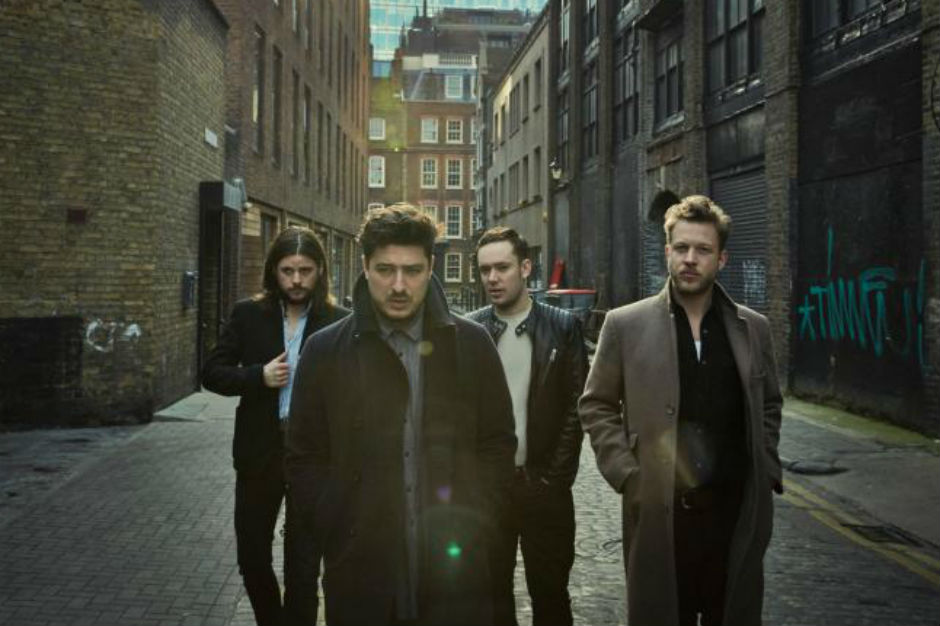Release Date: May 07, 2015
Label: Island / Glassnote
Here’s a sentence that would’ve made absolutely no sense in 2005 (and only slightly more in 2015): The biggest band in the world desperately wants to sound like the National. British folk-blasters Mumford & Sons‘ second and most recent album, 2012’s Babel, sold 600k in its first week and has racked up another two mil since in the U.S. alone. It went on to win the Album of the Year Grammy and establish the quartet as the preeminent international touring act among contemporary rock(-ish) artists. Their signature strum-and-stomp sound has only become more pervasive in the years since, even being normalized through both the EDM and mainstream rock worlds via humongous singles by Avicii and Imagine Dragons respectively. Given that there wasn’t exactly a ton of artistic development or notable experimentation displayed by Babel — a commercial monster of essentially unmatched proportions by ’10s rock standards — staying the course would have been the predictable (and likely advisable) move for the band’s third LP.
Nope. In case you haven’t heard by now, Mumford & Sons have discarded their banjos for Wilder Mind, in favor for that more conventional six-string rock instrument, in a move that would more acutely echo the borderline-apocryphal narrative of Dylan Going Electric if a) “Selling Out” was a concept that still had any currency and b) the majority of Mumford fans were actually folk listeners. In any event, aforementioned indie stalwarts the National are now clearly the model for the quartet, a long-simmering fascination — they covered High Violet‘s “England” in ’11, and recently rhapsodized to the NME that they’d “been huge fans of The National for ages. All of us, individually have got a very personal attachment to their music” — that’s culminated in the Londoners decamping to the New York garage studio of National guitarist Aaron Dessner. The group has subsequently traded in their vests for overcoats in their media photos, and now look less like busking rogues roaming Irish streets than upwardly mobile Williamsburgites closing down an after-hours whiskey bar.
https://youtube.com/watch?v=_J1lUNauuEI
The results are stunning, in at least one way. From the first echoing guitar lines of opening track “Tompkins Square Park” — one of two tracks on the album named after specific New York locations that have virtually nothing to do with the songs thematically, like a bragging postcard to their friends back home — the transformation is jaw-dropping, especially as the bass rumble and insistent drum thump kick in and all of a sudden you get acid craft-beer flashbacks to five simultaneous songs on Trouble Will Find Me. Other 21st-century underground rock touchstones abound throughout Wilder Mind — bluesy War on Drugs guitar streaks through the night sky on “Snake Eyes” and the title track, while the atmospheric, picking-heavy slow builds of “Ditmas” and lead single “Believe” flash Interpol in bright lights. But the National is the touchstone, with even Marcus Mumford’s vocals knowingly approaching the soaring solemnity of Matt Berninger on several tracks.
The cynical (and perhaps practical) viewpoint to take on this change in direction is to say that having scaled to essentially the highest heights of album sales and stadium success afforded to a rock-based outfit in 2015, the band adjusted their sights to different metrics: A Pitchfork rating, perhaps. For all the accolades granted Mumford & Sons in their ascent to superstardom, traditional critical acclaim has mostly eluded them; Babel earned a middling 63 score on review-aggregating site MetaCritic, and inspired a backlash big enough for the NME to ask “Why Do People Hate Mumford & Sons So Much?” To court the sound of a band like the National (last three MetaCritic scores: 84, 85, 86) could ostensibly be to court their audience and their noteworthy co-signers as well, among the final worlds the quartet have left to conquer.
Such open underground-slumming would seem to leave Mumford & Sons vulnerable to new levels of disdain from those the group is attempting to appeal to, but damn if their 2015 indie-rock facsimile isn’t a convincing forgery. When the chugging guitars and crescendoing drums of the pre-chorus to “The Wolf” finally achieve liftoff with the song’s fiery instrumental refrain, it’s as satisfying as any of the banjo mega-bursts of the band’s first two albums. Same for “Ditmas,” which integrates the largesse of a typically emotive Mumford hook into a explosive power-pop chorus that could’ve ruled radio two decades ago. Just as importantly, songs like “Cold Arms” and the title track are more bubble than boil, providing the album contrast in atmosphere and dynamism, both of which were badly missing across the flatly anthemic and maddeningly repetitive Babel.
Where the album fails to eclipse its predecessor, and where it fails to match the band’s new Brooklyn buddies, is in Marcus Mumford’s vanilla songwriting. People forget that as memorable as breakthrough M&S smashes “Little Lion Man” and “The Cave” were for their then-radio-unfriendly four-string leads, they were just as noteworthy for their bitter (“Your grace is wasted in your face / Your boldness stands alone among the wreck”), often violent (“I will let you choke on the noose around your neck”) lyrics, which were startlingly raw for early-’10s crossover hits. On Babel, those sentiments were replaced with bland comfort (“I will wait, I will wait for you”) and unspecific romanticism (“Hold me fast, ’cause I am a hopeless wanderer”). That trend continues with Wilder Mind, which aside from satisfying the requisite one-“fuck”-per-album clause on album lowlight “Monster,” keeps things nice and inoffensive on mostly love songs full of sweeping, detail-void sentiments like “Oh babe I’ve never been so lost / I wanna hear you laugh one last time” (“Tompkins Square Park”) and “And I hunger and I thirst… For some whispered words” (“Only Love”).
Ultimately, as much as it may shock on first listen the gambit of of Wilder Mind‘s musical about-face might not be as, uh, wild as it initially seems. The kind of rock the Sons are aping here is a pretty natural fit for the group’s perpetually swelling dynamics — like the quartet themselves, just about all the album’s soundalike bands can be traced back to stadium overlords U2 in some respect, and indeed, parts of Mind sound enough like The Joshua Tree to get you combing the liner notes for a Daniel Lanois credit. Besides, “indie” in 2015 isn’t really indie anymore anyway — even the National themselves played the biggest stadium in Brooklyn a couple years ago — and Mumford do enough bet-hedging with the colorless chest-beating of their lyrics to keep it accessible to all anyway. The bet may or may not pay off for the Big Apple tourists — sales have thus far been (relatively) slow, and reviews harsher than ever, maybe they’ll end up indie out of financial necessity someday after all — but Wilder Mind will undoubtedly end up serving as sufficiently thoughtless comfort food for a whole new demographic.





